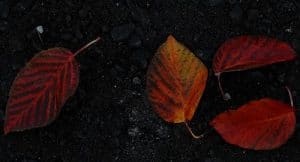Raking leaves again

The yard is clean and smooth again waiting for nature’s hand to paint the first coat of winter white. The air is crisp and still. As I take in the scene from the window, I find it hard to believe that it has been 25 years since I wrote my last column about my personal version of the New England ritual of raking leaves, but here we are. Now, across the threshold of winter, there is time to take the long view of a process that has alternately challenged, vexed, and satisfied me for most of my adult life.
When I was a young man busy practicing psychology and raising a family, my wife and I had only the weekends to clear the yard of what amounted to 100 bags of leaves every fall. Our goal was to get the job done by Thanksgiving, and if the weather cooperated, we usually succeeded.
That meant at least four long days of raking and hauling our leaves off to the town dump or piling them on a compost heap in a corner of the yard. The work was tiring but, at the same time, invigorating in the autumn air, conducive to reflection and challenging. The challenge was to find the most efficient way to do the job, the ideal balance between taming nature and simply living as part of it.
At first, we tipped the balance in the direction of taming and swept the yard clean of every fallen leaf. When that became too hard, we started the compost pile and reveled in witnessing how this mess of unraveling nature spawned deep, rich soil tilled by worms and thousand-leggers. In went the pitchfork and out came a wriggling creature. Once a toy blue plastic man emerged from the ooze, soiled but intact, a symbol, I was certain, of human resilience in the face of all the hardship that life could heap upon us. That happened in the year my father died.
Years passed, the children grew and we lived through the joys and sorrows that life brings to us all. We put an addition on our house, changed the shape of the yard and cut down some trees, but there seemed to be just as many leaves to rake every fall. And so, I raked, raking the actual leaves and the metaphorical leaves, symbols of unwanted sadness that we could either hide away in the town dump or put in a protected space to do the alchemist’s work of turning sorrow to wisdom.
I thought of my patients as I worked, one in particular who hid his leaves of sorrow under a cover of alcohol, drugs, and gambling. I took satisfaction in being a psychologist and felt grateful for the opportunity to help people face the pain in their lives and allow it to do its transformative work.
Then one day we reversed course, abandoned the compost heap and resumed our practice of bringing 100 bags of leaves to the town dump. I still believed in the healing power of nature’s alchemy and the importance of accepting life’s painful emotions, but home composting had run its course and lost to the attractiveness of a clean yard and the practicality of getting better quality soil for free at the dump.
Now with both of us retired, my wife and I are no longer limited to weekends to dispatch the leaves, and eight-hour days of raking, hauling and disposing of our spent New England foliage have become a remnant of our shared history. The passing years leave their mark, and as much as we try to remain active and young at heart, our bodies do not hesitate to set their limits. And so we listen, compromise when we can, and establish a routine that works, at least for the time being.
When the first thin carpet of leaves covers the lawn and starts to gather around the trunks of the trees at the base of the hill, we make our first pass. The years have taught us that wide-bottomed rakes with steel tines are best for the job. The work is easier still with plastic chutes that hold open the big paper bags hungry for the armloads of leaves that we drop into their waiting maws. The chutes weren’t around when we first started tending our lot over 40 years ago, and like most things these days, they mark the passing time.
New inventions show our progress and old markers map the way we have come. At the bottom of the slope in one corner of the yard, an aluminum canoe lies on its side propped against a tree. We’ve had it for longer than we’ve owned the house but haven’t used it in decades. When we sell it, someone will get an indestructible boat and we’ll get to keep the memories it carries. My rake glides over the pet cemetery, no stone markers, just a smooth patch of earth covering a hamster, a cockatiel, assorted woodland creatures, and an old man’s cat that died in our window well.
These days, we try to keep up with the leaves as they fall, making several passes over the yard, filling the nine bags that fit comfortably in the car and bringing them to the dump over a period of weeks until the job is done. Though the autumn leaves are always a good metaphor for sadness, these days I see them more as what they are – just leaves.
When you’re well into your seventies, you don’t need metaphors to remind you that loss comes around, sadness lurks, and time moves too fast. It is enough to enjoy being outside in the crisp days of autumn, to find satisfaction in the work and to get it done with time to spare for the delights that the season holds.
